In Syria's Eastern Ghouta, a doctor's battle: 'We will stay until the end'
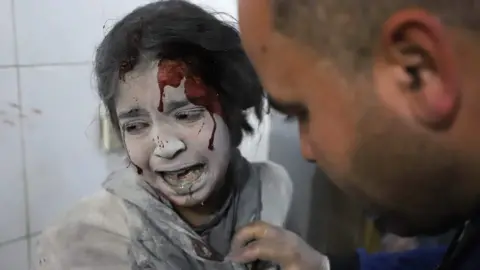 AFP
AFP
As the Syrian government tightens its noose around the Eastern Ghouta, and air strikes pound the enclave from above, doctors and medics are locked in a desperate battle to save the wounded. Fearful of targeted strikes, they asked the BBC to withhold their real names and locations. You may find some of the images upsetting.
 BBC
BBCDr Hamid's family lives in one room now — a cramped, dimly-lit garage attached to the building that used to be their home. The rest of the house, in a suburb of the Eastern Ghouta, near Damascus, was destroyed a month ago, days after the Syrian government began a brutal escalation of force against the enclave.
Dr Hamid, 50, leaves the makeshift shelter three times a week for a nearby hospital, where he is a trauma doctor. Each time he kisses his wife and five children goodbye, he tries not to think that it might be the last time. He cycles to the hospital through deserted, rubble-strewn streets, mindful of the danger of being outside even for a few minutes. If the bombing is heavy, and there are many injured, he might work for more than 24 hours without a break. When he is treating wounded children he thinks of his own children, and in the short pauses between patients he prays for their lives. There is no respite.
On Thursday, Syria entered the eighth year of its civil war. More than 400,000 people are believed to have been killed or are missing, presumed dead. Three of Dr Hamid's own children, and many of the children brought to his hospital, have never known peace. The injured children arrive with penetrating shrapnel wounds, missing limbs, severe burns, or sometimes with no visible injuries at all, and yet lifeless, with a lingering smell of gas on their bodies.
"Most of the children who die have been shelled in the head or have injuries in their abdomen or bowels, and I have seen some cases of penetrating wounds directly in the heart," said Dr Hamid.
"These children need specialist surgeons and seven or 14 days in intensive care," he said. "Many could be saved. In London they could be saved. In Ghouta we cannot do anything. We try to stop the bleeding and make it OK for them, then we allow them to die."

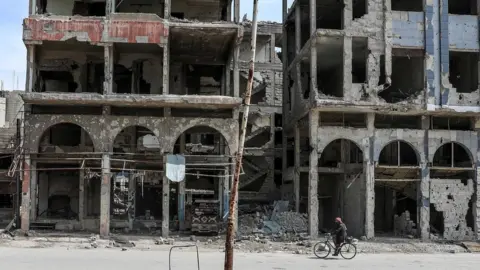 EPA
EPA
Backed by heavy Russian air strikes, Syrian pro-government forces are tightening the noose around the Eastern Ghouta, one of the last rebel redoubts in Syria. At least 1,100 civilians have been killed since the regime stepped up its air war last month and cut the enclave into three pockets. The rebels have shelled civilians in neighbouring government-controlled areas and, according to a UN official, used snipers to kill those attempting to flee.
In phone interviews, four doctors and medical staff described work in the enclave as a raw and restless battle to save people from death, with little or no room left to rescue limbs, preserve sight, or ward against fatal infections. Successful treatment had become a binary calculation, they said: alive or dead.
This week, a five-year-old boy arrived at Dr Hamid's hospital with multiple trauma wounds and fractures in both his legs and arms. Dr Hamid sutured the boy's wounds and amputated one of his arms and one of his legs at the upper thigh. "That is his future," Dr Hamid said. But the boy is alive, that is a success.
The same day, an 18-month-old girl was brought in with a massive laceration to her thigh after a barrel bomb attack, completely severing her artery. Dr Hamid tried desperately to connect the leg and restore some blood flow, but he could not suture the artery properly.
"We do not know in the future if she will walk or if her leg will be only a picture of a leg," he said. "But she is alive." A success. The same week, five young children who were brought to Dr Hamid died. "When we are dealing with children, we hope God will look to them," he said, letting out a long, deep sigh. "I'm sorry, words cannot express this."

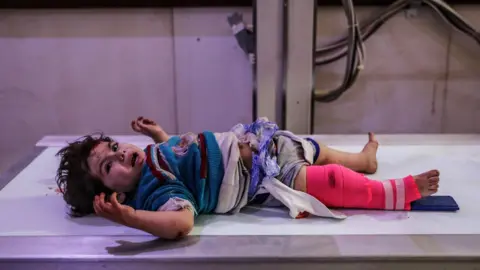 EPA
EPA
About 50 patients in need of urgent medical care were evacuated from the Eastern Ghouta this week, and civilians from some areas are beginning to escape, but the UN estimates that about 390,000 people remain trapped, hiding in makeshift underground shelters with limited access to food, water, sanitation and medical treatment.
Direct attacks on health care facilities have spiked in recent weeks, according to the World Health Organisation, mostly in the Eastern Ghouta. A third of Dr Hamid's hospital has been damaged. The functioning parts are crowded with the wounded, making it hard to move around, and when the shelling is bad there are dead bodies on the floor that cannot be removed. Last week, the staff could not take out the bodies for 48 hours.
All over the Eastern Ghouta, medical staff are physically and emotionally exhausted, said Lorena Bilbao, Syria co-ordinator for Doctors Without Borders. "They have been working almost non-stop, with few hours' sleep, no regular meals, and the constant frustration and fear of the bombing," she said.




The escalation in February brought with it new weapons and a "new kind of horror", said Atef, 36, a radiologist at a surgical hospital in the enclave. Suddenly they were seeing patients with multiple severe injuries. "We are not used to this level of wounds," he said. "We cannot help them. When you look around, there is desperation on the faces of the staff."
Many of those left in the Eastern Ghouta are now hiding underground. Atef lives in a basement under a public building, with his wife, children, and 100 other people. Mohammed, a 23-year-old medical student who was forced to abandon his studies to become a full time war medic, lives with his family in a neighbour's basement, where 30 people are crammed into three small rooms and there is no electricity or water.
To pass the time, the family members talk in the dark or run down the batteries of their phones playing games. Five of Mohammed's cousins died in the past month, he said. So did his uncle, his sister's husband, his brother's wife, and her entire family.
"The patients are also our family," he said. "We will carry on treating them until all the medication is gone. Until we stand with nothing. Until the last minutes."

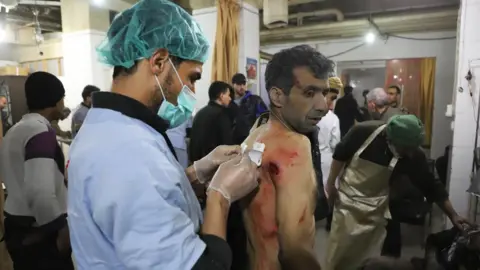 AFP
AFP
A Red Cross convoy carrying food parcels was allowed access to the enclave on Thursday but no medical supplies were permitted. According to the World Health Organisation, the Syrian regime confiscated 70% of medical supplies from a previous convoy, including trauma kits, surgical kits and insulin.
Doctors Without Borders says there is now only one vascular surgeon left in the region and no possibility to transfer patients, leaving general doctors with no choice but to amputate limbs that could be saved. Dr Hamid estimated that the hospital could have as little as a few weeks' worth of anaesthetic left, raising the fearful prospect of amputations with no pain relief.
"We are working with stitches that were used before, disposable gloves that we wore before, chest drainage that was used on other patients," he said. "Most wounds get infected and need bandages, but we are using bandages that we used before."
There is also no lab equipment to test for the presence of the toxic chemical chlorine, which medics and opposition activists say has been used as a weapon by pro-government forces. The government denies using any kind of chemical weapons, but their claim is undermined by a UN conclusion that it used chlorine at least three times in 2014 and 2015, and by a current UN investigation into reports of chlorine use in January in the Eastern Ghouta.
On the ground, it is undermined by the irritated eyes and airways, and the powerful smell that lingers on patients, described in detail by three members of staff at Dr Hamid's hospital.
"To us it is obvious after an attack," said Dr Hamid. "Everyone who comes in the ambulances has the same smell."
Exposure to chlorine doesn't generally kill, but it can if your lungs are very small. You can drown in the fluid that builds up. Dr Hamid and Mohammed recalled two cases brought in on the same day.
"We saw a three-month-old baby girl and a boy of two years," said Mohammed. "The girl was on ventilation for a week and she survived, but the boy died. He was blue and the smell of his body was full of chlorine."

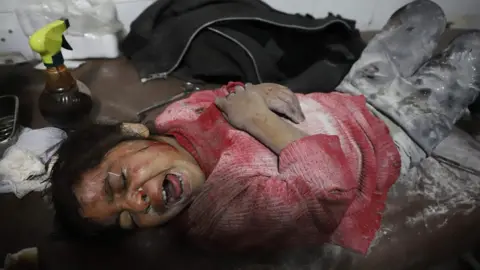 AFP
AFP
As the seventh anniversary of the conflict passed, the steadily worsening brutality in the Eastern Ghouta reflected the state of the wider war. The government of Bashar al-Assad says it is cleansing the nation of terrorists, but it has pounded the country indiscriminately, killing tens of thousands of civilians.
"They say they are killing terrorists but we are not terrorists. The people I see dying are women and children," said Dr Hamid.
He is counting down now until the IV antibiotics, anaesthetic, and insulin at the hospital run out, which will not be long if no supplies are allowed in. There is already no dialysis available, consigning chronic kidney patients to a slow, terrible death from renal failure.
The place where Dr Hamid was born and raised had been abandoned to its own slow death, he said. It was a place that people came to from Damascus, with their wives and husbands and children, for weekend picnics, or to shop for cheap merchandise in the bustling markets.
"They came here from all around to smell the fresh air and the rivers and the trees," he said. "To me it was a paradise on the Earth."
Now he prays in his cramped shelter at night that his children will one day see the place he can still conjure in his mind, "as green as it was when I was a boy".
"It may be too late for me," he said, "but God willing, our children will see these days."

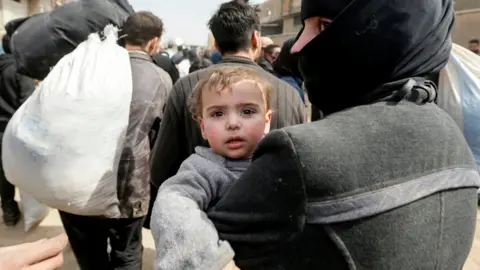 AFP
AFP
Follow Joel Gunter on Twitter: @joelmgunter
